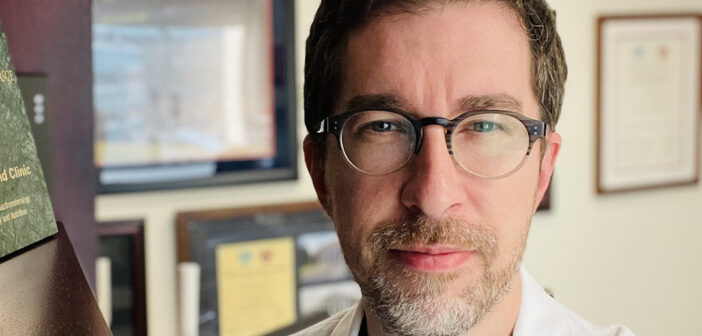Tyler Berzin works with a Brunonian in China to improve colonoscopies.
“One of the great traditions of academic research is the passing of the torch,” gastroenterologist Tyler Berzin ’99 MD’03 says. “One group advances the research as far as possible, and, by communicating openly about it, allows other researchers across the world to pick it up and carry it forward.”
Berzin’s firsthand experience with that phenomenon happened to ally him with a Brown alum working in a different discipline, and across the globe, to solve a problem in colorectal cancer screening.
As an academic gastroenterologist and an advanced endoscopist at Beth Israel Deaconess Medical Center and Harvard Medical School, Berzin led a collaboration between MIT and Harvard to develop an artificial intelligence application that would boost the effectiveness of colonoscopy exams.
When the team published their research in 2015, the paper reached mathematician Sophie Xiao ScM’07 PhD’11 in Chengdu, China, through a physician friend interested in the project. She realized math could remove two roadblocks in the gastroenterology research—the computing power required during the analysis of real-time videoscopic images, and the training of a deep learning system on relatively small datasets. Her collaboration with Berzin’s team produced software called Endoscreener, now being developed by Shanghai-based Wision AI, of which Xiao is the chief scientist.
Berzin says colonoscopy is uniquely effective at prevention, because this endoscopic view of the colon allows clinicians to find precancerous polyps and remove them years before they turn malignant. He says stool-based tests like Cologuard, for example, just enable damage control by detecting early signs of malignancy, rather than an early, precancerous lesion. That said, the preventive powers of colonoscopy are compromised by the rate at which clinicians fail to detect polyps that are present—the adenoma miss rate—because they’re hidden by folds of tissue, or they’re flat and difficult to see.
Berzin’s team set out to show that machine vision could improve the detection rate. In a 232-patient randomized clinical trial, clinicians aided by Endoscreener detected 20 percent to 30 percent more polyps and excelled on other measures, like achieving lower miss rates for flat lesions. The FDA approved Wision’s polyp detection system in November 2021.
“It was quite clear that a human-AI hybrid was the best approach,” Berzin says. He emphasizes that the physician is still doing the careful inspection and making the decisions. “The AI is a safety feature, like a lane departure warning when you’re driving a car. You’re still the one driving; the technology just helps you perform more consistently.”
In the US, there are now at least three FDA-cleared AI systems for polyp detection, and more are coming. In the next several years, Berzin believes this will become a routine part of screening colonoscopy.
“This really touches at the heart of what gastroenterologists do,” he says. “We are at the front line of colon cancer prevention. Most of us want to leverage our own skills, technology, and every advantage possible to protect patients more effectively.”




